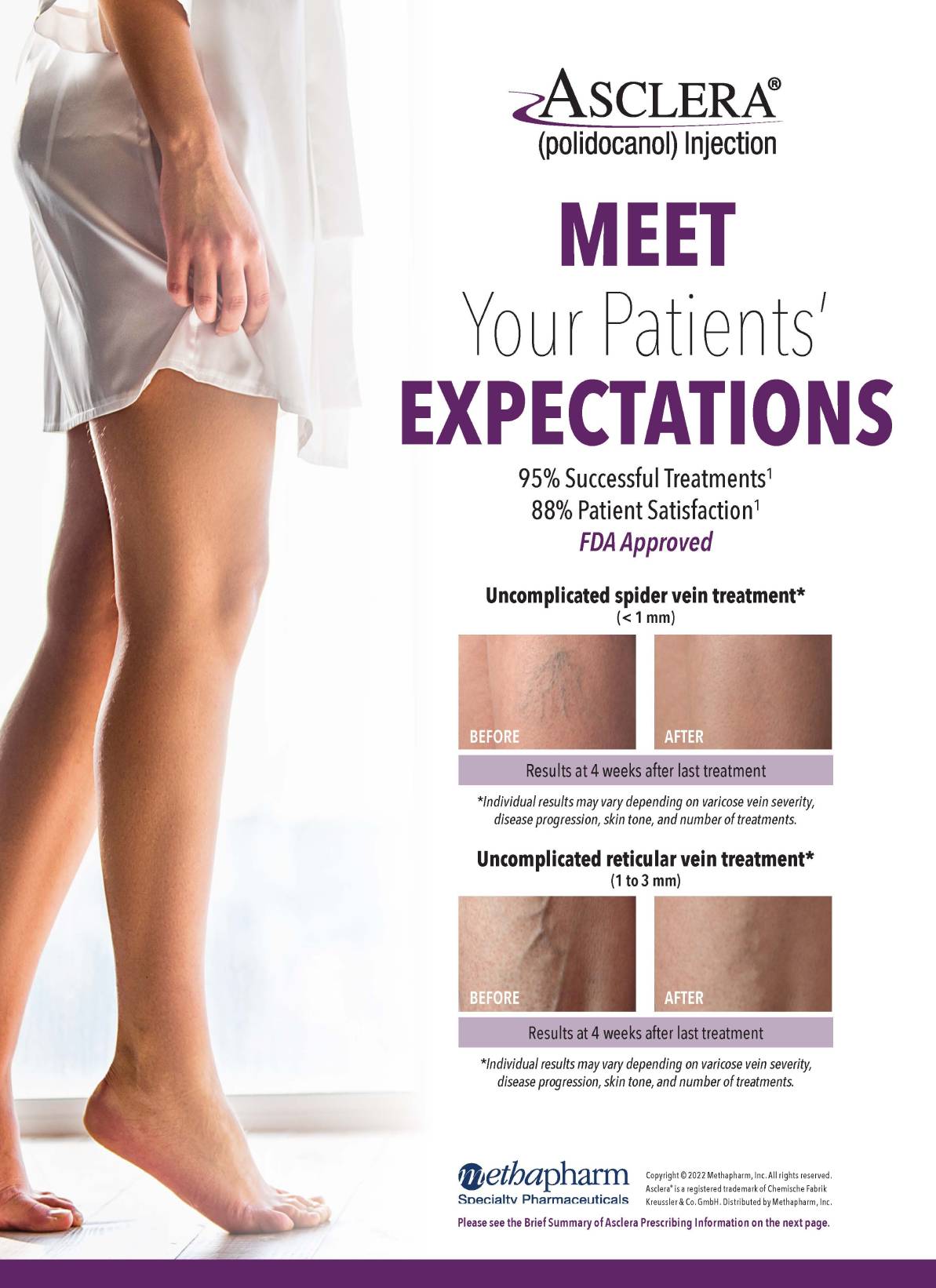


Asdera® (polidocanol) lnjection Rx Only
INDICATIONS: Asclera (polidocanol) Injection is indicated to sclerose uncomplicated spider veins (varicose veins < 1 mm in diameter) and uncomplicated reticular veins (varicose veins 1 to 3 mm in diameter) in the lower extremity. Asclera has not been studied in varicose veins more than 3 mm in diameter.
IMPORTANT SAFETY INFORMATION: For intravenous use only.
CONTRAINDICATIONS: Asclera (polidocanol) Injection is contraindicated for patients with known allergy (anaphylaxis) to polidocanol and patients with acute thromboembolic diseases.
WARNINGS AND PRECAUTIONS: Anaphylaxis: Severe allergic reactions have been reported following polidocanol use, including anaphylactic reactions, some of them fatal. Severe reactions are most frequent with use of larger volumes(> 3 ml) The dose of polidocanol should therefore be minimized. Be prepared to treat anaphylaxis appropriately.
Venous Thrombosis and Pulmonary Embolism: Asclera can cause venous thrombosis and subsequent pulmonary embolism or other thrombotic events. Follow administration instructions closely and monitor for signs of venous thrombosis after treatment. Patients with reduced mobility, history of deep vein thrombosis or pulmonary embolism, or recent(within 3 months) major surgery, prolonged hospitalization or pregnancy are at increased risk for developing thrombosis.
Arterial Embolism: Stroke, transient ischemic attack, myocardial infarction, and impaired cardiac function have been reported in close temporal relationship with polidocanol administration. These events may be caused by air embolism when using the product foamed with room air (high nitrogen concentration) or thromboembolism. The safety and efficacy of polidocanol foamed with room air has not been established and its use should be avoided.
Tissue lschemia and Necrosis: Intra-arterial injection or extravasation of polidocanol can cause severe necrosis, ischemia or gangrene. Care should be taken in intravenous needle placement and the smallest effective volume at each injection site should be used. If intra-arterial injection of polidocanol occurs, consult a vascular surgeon immediately.
After the injection session is completed, apply compression with a stocking or bandage, and have the patient walk for 15-20 minutes. Keep the patient under supervision during this period to treat any anaphylactic or allergic reactions.
Maintain compression for 2 to 3 days after treatment of spider veins and for 5 to 7 days for reticular veins. For extensive varicosities, longer compression treatment with compression bandages or a gradient compression stocking of a higher compression class is recommended. Post-treatment compression is necessary to reduce the risk of deep vein thrombosis.
ADVERSE REACTIONS: In clinical studies, the following adverse reactions were observed after using Asclera and were more common with Asclera than placebo: injection site haematoma, injection site irritation, injection site discoloration, injection site pain, injection site pruritus, injection site warmth, neovascularization, injection site thrombosis.
POST-MARKETING SAFETY EXPERIENCE: The following adverse reactions have been reported during use of polidocanol in world-wide experience; in some of these cases, these adverse events have been serious or troublesome. Because these reactions are reported voluntarily from a population of uncertain size and without a control group, it is not possible to estimate their frequency, reliably, or to establish a causal relationship to drug exposure.
Immune system disorders: Anaphylactic shock, angioedema, generalized urticaria, asthma. Nervous system disorders: Cerebrovascular accident, migraine, paresthesia (local), loss of consciousness, confusional state, dizziness.
Cardiac disorders: Cardiac arrest, palpitations.
Vascular disorders: Deep vein thrombosis, pulmonary embolism, vasovagal syncope, circulatory collapse, vasculitis.
Respiratory, thoracic, and mediastinal disorders: Dyspnea.
Skin and subcutaneoustissue disorders: Skin hyperpigmentation, allergic dermatitis, hypertrichosis (in the area of sclerotherapy).
General disorders and injection site conditions: Injection site necrosis, pyrexia, hot flush injury, poisoning, and procedural complications: Nerve injury.
REFERENCE: 1. Rabe E, Schliephake D, Otto J, Breu F, Pannier F. Sclerotherapy of telangiectases and reticular veins: a double-blind, randomized, comparative clinical trial of polidocanol, sodium tetradecyl sulphate and isotonic saline (EASI study). Phlebology. Jun 2010;25(3):124-131.
Please ask your healthcare provider or visit www.asclera.com for Full Prescribing Information.
You are encouraged to report any suspected adverse events. To report SUSPECTED ADVERSE REACTIONS, contact your Healthcare Provider, Methapharm Medical Information at 1-866-701-4636, or FDA at 1-800-FDA-1088 or www.fda.gov/medwatch.
Copyright© 2022 Methapharm, Inc. All rights reserved
Asclera® is a registered trademark of Chemische Fabrik Kreussler & Co. GmbH. Distributed by Methapharm, Inc ASC-US-VMAD-0322